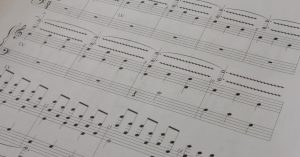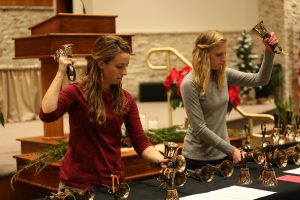I don’t spend a lot of time on social media.
Unless I am replying to a few comments from my own posts, I usually try to limit myself to posting once a day, and every few days I will take a look at some posts from other people.
But one day about 6 years ago, I randomly went to the Facebook page of a friend that I don’t talk to often because I was curious to see what was going on in his world.
His most recent post was a stunningly simple but beautiful video of a new song that most people had not yet heard.
Mesmerized, I watched the video over and over again.
As a videographer, I sat there analyzing and reanalyzing the amazing scene that was shot in a single take, but I couldn’t help but also revel in the wholesome music that sounded like it was pulled straight out of Scripture.
Eventually, I stopped long enough to send the video to a few of my friends, and they all agreed that it was a great song that they had never heard before that moment.
It wasn’t long before the rest of the Christian world heard about the song, especially after it was popularized by a well-known singer. But my favourite rendition is still the original one, and I still go back once in a while to admire the videography of that first public release.
I have no claim to fame for the song, and it was my friend who posted it for me to see, but I was definitely one of the first few to know about it before it became popular.
Since then I have taught it to my church family and led several groups of people in singing it outside of my church.
Every time I sing it, I envision myself being transported into the heavenly throne room as described in Revelation 4-5.
“Is He Worthy? Is He Worthy? He is! He is!”
 Between the back-and-forth nature of the song that appeals to our biblical understanding of God, the emphasis on all three Persons of the Trinity, or the reminder that God has done everything that could be done to draw the world back into an eternal relationship with Himself, I thought that Andrew Peterson and Ben Shive did a masterful job of arranging this song.
Between the back-and-forth nature of the song that appeals to our biblical understanding of God, the emphasis on all three Persons of the Trinity, or the reminder that God has done everything that could be done to draw the world back into an eternal relationship with Himself, I thought that Andrew Peterson and Ben Shive did a masterful job of arranging this song.
So many people have said similar things about how this song has pointed them to Christ and reminded them that God will make all things new again someday because of what Christ has done for us.
Never had I heard a single negative thing about this song’s content…
Until this week.
The Character of the Singer
Someone came to me because I led this song at a recent event, and they wanted to talk to me about it.
I will not name the person because it doesn’t matter who it was, and I will do my best to give an accurate representation of what they said since it was in no way intended to be disparaging. They came to me in a good spirit and out of a desire to be helpful, so I want to respond in a like manner.
They began, “Did you know that this song is by Chris Tomlin?”
I responded, “He sang it, but it’s not his song.”
“Yeah, he has sung a lot of people’s songs.”
As for what else he said about Chris Tomlin, I will not repeat that part of the conversation here.
Some people really like Chris Tomlin. Personally, I don’t share that same sentiment.
But regardless of my opinion on him, from time to time, I have sung songs that Chris Tomlin has sung and even written. Whether or not it was right or not for me to do that is not the point of this post, and with greater context and understanding of those specific songs, you would be welcome to be the judge of my actions.
But as for the song “Is He Worthy,” I cannot and will not judge that song based on the person and character of Chris Tomlin anymore than I would judge a portion of Scripture based on the character of Ravi Zacharias.
No, I’m not comparing Tomlin and Zacharias. But Zacharias quoted Scripture, and it now appears that he was not the godly man of high character that everyone thought him to be. But that does not mean that the Scripture that he quoted is untrustworthy.
Likewise, just because Chris Tomlin sings a certain song that someone else wrote, does not mean that song is a bad song. I think that you should judge each song based on its inherent message and authorial intent.
Scripture is different because we should accept it as true even if we don’t understand it. Music written by humans requires a little more scrutiny.
But having gone over “Is He Worthy” multiple times, I do not believe that Peterson and Shive had evil intent, and I believe the message of the song is biblical and sound.
Hence, I am not telling you what this friend said about Chris Tomlin, and I am not making an appeal to the person of Tomlin one way or another because it is not a song that he wrote.
He merely popularized a version of it that I think is inferior to the original (now you know how I truly feel).
The Content of the Song
As for the content of the song itself, this concerned person said that “Is He Worthy” is a bad song (he may have used a harsher adjective, but I can’t remember for sure, and I don’t want to misrepresent him) because it fosters emotions of doubt within us.
He said that the song asks questions over and over again that we already know the answers to, so we shouldn’t be asking them in the first place. Asking those questions causes us to doubt what we already know to be true.
To be fair, I can kind of see what he meant. Although he didn’t mention this example, perhaps he recalls the serpent’s questions to Eve in Genesis 3 that were intended to plant seeds of doubt.
In my opinion, that would be the best example of doubt-inducing questions in the Bible.
He did admit that even though the song asks a lot of questions, it answers all of them immediately. If you know the song, you know this to be true. Every single question is answered immediately or within just a few seconds by a satisfactory, biblical response.
But he said that if you read through the complete text and do the math, it asks more questions than it gives answers, so ultimately the song ends with more questions than answers, causing us subconsciously to start to doubt.
He said that if Jesus had been present when we sang that song, He would not have been happy with us singing it because of the questions that we were asking in the song. Jesus would not want us to ask those questions and doubt who He is.
This was the first time I had ever been confronted with this perspective, and I never would have imagined that this would be the song that someone would use to talk about doubting God!
But I also want to be objective and reasonable and listen to what other people have to say instead of just sticking with my own opinion.
We are all different and come from different backgrounds, and we should always be sensitive to the thoughts, feelings, and experiences of others.
So when he asked me what I thought about his perspective, I said, “Well, I know that there are times in the Bible where questions are asked and answers are given, so I would have to study it some more and see what happened each of those times. Were the questions intended to cause doubt, or were they answered immediately, or was there a purpose for asking them? I would have to take a look at it some more and see what I find.”
Listen, understand, and do my research. Then if I feel that a defense is necessary, I can do so when I am finished. But I wanted to respect and honour him, his time, and his concern instead of jumping to conclusions on a song that I love so much.
The Questions in the Song
Since I already addressed his first concern (that Chris Tomlin sang the song), I will focus here on the second issue that he raised concerning the worthiness of the song because of the numerous questions that it poses.
The immediate context of the song is Revelation 4-5, and I make a habit of reading a portion of that Scripture almost every time I lead the song.
Revelation 5:2-3 says, “Then I saw a strong angel proclaiming with a loud voice, ‘Who is worthy to open the scroll and to loose its seals?’ And no one in heaven or on the earth or under the earth was able to open the scroll, or to look at it.”
The angel asks the question, and the answer returns painfully silent. You can almost feel the universe crying in agony, “What? No one?!” Well, at least in John’s limited understanding.
In verse 4, he says, “So I wept much, because no one was found worthy to open and read the scroll, or to look at it.”
Now, if those few verses don’t instill a little doubt in you, I don’t know what does.
But then one of the elders comforts him in verse 5: “Do not weep. Behold, the Lion of the tribe of Judah, the Root of David, has prevailed to open the scroll and to loose its seven seals.”
A question and an almost immediate answer. But there was still enough space between the question and answer for John to weep. This is quite interesting because John knew Jesus and should have known that He was worthy! Perhaps he just didn’t know what all was required for someone to be eligible to open the scroll?
Okay, back to the song. “Is He Worthy” doesn’t echo this question in Revelation 5:2 word for word, but the premise of the song is the same.
Rather than asking, “Who is worthy,” the song instead anticipates that we already know the answer. So it asks, “Is He Worthy,” to which we reply, “He is.”
Is this difference in the wording of the question enough to warrant a negative reaction to the question of “Is He Worthy?”
I personally don’t think so because the parallel with Revelation 5:2 seems extremely obvious to me.
But lest I focus too much on that singular question that is repeated throughout the song, let’s now turn our attention to the other questions in the song.
“Do you feel the world is broken?”
This question is simply about the state of our world and is a fair question to ask. Nothing about this question casts any doubt on the person or character or work of God.
Yes, I do indeed feel that the world is broken. This is not how God designed it.
“Do you feel the shadows deepen?”
Once again, this question does not cast any doubt on God. If anything, it casts doubt on the efforts of man to make the world a better place because we are failing miserably.
Yes, I do feel the shadows deepen. This world is dark and ugly.
“But do you know that all the dark won’t stop the light from getting through?”
This is actually a question that probes the extent of our Bible knowledge. Do we only know that the world is broken and dark, or have we also learned what the Bible says about God overcoming the darkness? The structure of this question is unique because it communicates a ray of hope with the sole purpose of alleviating any doubts that we may be harboring.
“Good news! In case you didn’t already know, the light will defeat the darkness! Are you convinced of this?”
Yes, I am.
“Do you wish that you could see it all made new?”
This is a genuine, good-natured question, especially for those of us who really love the world and all that it offers us right now. Are we content with this world the way it is?
Nah. I want to “see it all made new.” Thanks for asking.
Next set of questions.
“Is all creation groaning?”
Definitely not a question that would instill doubt but perhaps even a check on our consciousness to see if we are only wrapped up in the beauty of the world or if we also recognize the truth of Romans 8:20-22.
I’ve traveled around this world and seen a lot. Yes, it’s groaning. I don’t doubt that at all.
“Is a new creation coming?”
Okay, why would we ask this question? Maybe we’re doubting that God will recreate the world? Or, perhaps many of our churches haven’t actually educated people about the new heaven and the new earth (Revelation 21:1), and we all think that after this world is destroyed we will live eternally in heaven?
Based on the illiteracy of many Christians when it comes to the future eternal realms, I think this question could might cause some people to stop and say, “Wait, is that really a thing?”
That would be a good thing.
“Is the glory of the Lord to be the light within our midst?”
This is another good, thought-provoking topic that we do not broach often, so I think we should talk about it. Will the glory of God be the light amongst us?
Yes, in the absence of the sun, yes, God’s glory will be our light. Rather than doubting that fact, this question causes me to stop and reconsider the significance of that truth.
“Is it good that we remind ourselves of this?”
Your answer to that question, I suppose, would be altered by your opinion of the song. If you think these are bad questions, maybe these questions are not helpful reminders for you.
But if you think the questions are good, yes, these rhetorical questions cause you to remember what you’ve learned and perhaps strengthen your faith.
Up until now, none of these questions should cause us to doubt who God is or what he has done. Do you disagree?
At this point in the song, the chorus begins and asks several questions.
“Is anyone worthy? Is anyone whole? Is anyone able to break the seal and open the scroll?”
Straight from Revelation 5:2, right? As mentioned earlier, the question is slightly reframed, but it has the same effect.
The main difference is that by saying “is anyone worthy” rather than “who is worthy,” we are emphasizing that there is only one possible answer because of the standard unworthiness of the rest of us.
The chorus precedes to immediately recognize the Jesus of Revelation 5 as the answer to each of those questions.
Onto the last set of questions in the third stanza.
“Does the Father truly love us?”
This question sounds similar to those found in Psalm 10:1, 42:9, 44:24, 74:10, etc. Was it wrong for those questions in the Psalms to be asked? No, as long as they knew the answer and clung to that answer as truth.
I would say that the same thing happens here in this song, especially since the answer comes immediately.
What about the song, “I Stand Amazed,” where it says that I “wonder how he could love me, a sinner condemned, unclean”?
Isn’t it an amazing thing that God truly loves us?
Perhaps we should look at our sinfulness more often in the light of God’s holiness and ask ourselves, “Wait, does God truly love me?”
Rather than doubting this truth, perhaps we would gain an ever greater appreciation for just how much he loves us!
“Does the Spirit move among us?”
Some people may not know the answer to this question because we downplay the Holy Spirit so much. Perhaps we should also ask this question more often so that we are motivated to find the biblical answer?
“And does Jesus our Messiah hold forever those he loves?”
I can see how this question would be one that Satan could use to cause us to doubt: “Does Jesus really hold you forever?”
But then again, the wording of “Jesus our Messiah” acknowledges that Jesus is the one who delivers us, and Satan would not describe Jesus as the Messiah.
Some people already struggle with doubts about their eternal security, so if this song causes them to doubt further that Christ holds them forever, I hope they would confidently respond with everyone else, “He does!”
“Does our God intend to dwell again with us?”
If you already answered affirmatively to the questions about the light overcoming the darkness and the Father loving us, this one is a no-brainer.
No doubt, yes, God intends to dwell with us.
The Nature of the Questions
Do we see these types of questions in other places of Scripture outside of the Psalms?
Yes, in fact, we do.
Rhetorical questions are found many times in Scripture. But rather than look at all of them, I specifically want to see how God uses rhetorical questions.
We see the first instance in Genesis 3:9. After Adam and Eve sinned and tried to hide, God said, “Where are you?”
Was God trying to make them doubt that he knew where they were? Obviously not. They were now fallen human beings, but they were still smart. They knew that God knew where they were.
God then asks in Genesis 3:11, “Who told you that you were naked? Have you eaten from the tree of which I commanded you that you should not eat?”
Did God want them to doubt that they were naked or that they had sinned? Again, no.
These rhetorical questions did not cause them to doubt the truth of the questions. Rather, the questions emphasized what they already knew to be true. But now they had to vocalize these truths rather than just internalizing them.
In Job 38-39, we see one of the most powerful series of rhetorical questions in the Bible. Like the waters of the deep that burst open in Genesis 7, God pours out a flood of questions upon Job: “Where were you when I laid the foundations of the earth? Who determined its measurements? Or who shut in the sea with doors? Who has put wisdom in the mind? Who can number the clouds by wisdom?”
On and on he goes, barely giving Job time to think about the answer before moving onto the next question.
The end result? Job wasn’t doubting God!
No, Job rightly responded, “Behold, I am vile; What shall I answer You? I lay my hand over my mouth” (Job 40:4).
God never intended for Job to doubt him by asking all of those questions. He intended for Job to recognize more fully that God was who he already knew God to be!
In fact, on the contrary, he asked Job all of these questions because Job had started to doubt the character of God.
I think we have plenty of biblical proof that rhetorical questions can and should be used to remind ourselves of who God is. This does not dishonour God.
Summary
When someone asks me questions about the very essence of God, my initial response should be a defensive one, not one of doubt.
I ask people in my congregation all the time, “Is God good?” I don’t ever hesitate to ask that question because maybe someone will think, “Wait, is he good? Now I don’t know.”
No, I ask that question because I know that if they are truly saved, their response will be, “Of course he is good!” I am appealing to the intellect in such a way that a person will instantly respond with what they believe, not simply quote verbatim what someone else has told them to say.
So, based on my reading of Scripture and the questions contained therein, I am confident that “Is He Worthy” is a good song. Indeed, it is worthy of being used to worship God.
If, by asking the questions contained in the song, I start to doubt Jesus Christ rather than seeing the parallel with Revelation 5:2, I am no worse than John who wept rather than recognizing Jesus as the answer to the question.
Furthermore, if I start to doubt Jesus Christ because of these questions, shouldn’t the rest of the song be the reassurance I need that my doubts are unfounded?
If, at the conclusion of the song, I still doubt that Jesus Christ is worthy, how weak was my faith going into the song?
Honestly, the more I dissect this song, the more I’m convinced that the rhetorical questions in this song are a powerful way of drawing me back to the God I already know and emblazoning those truths deeper in my mind.
These truths about God should already be internalized, and the rhetorical nature of the song should encourage me now to vocalize what I know along with everyone else.
Now, for a completely different perspective on the original music video itself, you might find this post by Andrew Peterson thought-provoking.
Let me know what you think! Lay aside your biases and make an honest evaluation of this song. Do you think this is a good song or not, and why?

 As Easter approaches, churches are preparing their musical selections for their Sunday services.
As Easter approaches, churches are preparing their musical selections for their Sunday services. He is not here! He is risen, and now he sits at the right hand of the throne of God (Ephesians 1:20; Colossians 3:1). Christ does, however, continue to work in the world through the Holy Spirit and the congregation of the saved.
He is not here! He is risen, and now he sits at the right hand of the throne of God (Ephesians 1:20; Colossians 3:1). Christ does, however, continue to work in the world through the Holy Spirit and the congregation of the saved.
 “Joy to the World” as a hymn that reflects on the universal joy that should accompany the coming of the Lord, drawing inspiration from Psalm 98. The lyrics of the song were penned by Englishman Isaac Watts, a prolific hymn writer. The “Father of English Hymnody” published the lyrics in 1719 as part of his collection of hymns titled “The Psalms of David Imitated in the Language of the New Testament.”
“Joy to the World” as a hymn that reflects on the universal joy that should accompany the coming of the Lord, drawing inspiration from Psalm 98. The lyrics of the song were penned by Englishman Isaac Watts, a prolific hymn writer. The “Father of English Hymnody” published the lyrics in 1719 as part of his collection of hymns titled “The Psalms of David Imitated in the Language of the New Testament.” But have you thought about the fact that not everyone at a Sunday morning service is a believer, and therefore they cannot participate in worshiping God? I hope you have unbelievers on Sunday morning! If not, you need to go find some.
But have you thought about the fact that not everyone at a Sunday morning service is a believer, and therefore they cannot participate in worshiping God? I hope you have unbelievers on Sunday morning! If not, you need to go find some. When you play in a full handbell ensemble, very rarely will you ever play something by yourself that could stand on its own if everyone else was taken away. So you’re essentially learning to play a series of sounds that make little or no sense. They seem insignificant.
When you play in a full handbell ensemble, very rarely will you ever play something by yourself that could stand on its own if everyone else was taken away. So you’re essentially learning to play a series of sounds that make little or no sense. They seem insignificant. Born in 1819 in Ireland, Joseph Scriven was known as a hard-working, generous man. He loved serving others. He graduated from Trinity College in Dublin at the age of 24, and in 1844 he had plans to get married.
Born in 1819 in Ireland, Joseph Scriven was known as a hard-working, generous man. He loved serving others. He graduated from Trinity College in Dublin at the age of 24, and in 1844 he had plans to get married. We spent rest of the rehearsal practicing basic scales and some chords, all in the key of C major. We had a lot of fun, and almost all the mistakes were things that we could laugh about together.
We spent rest of the rehearsal practicing basic scales and some chords, all in the key of C major. We had a lot of fun, and almost all the mistakes were things that we could laugh about together. One of the beautiful things about handbells is the amount of teamwork it requires. It’s the relative equivalent of lining up several people at a piano and giving them each a few keys to plays.
One of the beautiful things about handbells is the amount of teamwork it requires. It’s the relative equivalent of lining up several people at a piano and giving them each a few keys to plays. As the national anthem played and the gold medalist stood there proudly looking at their nation’s flag, I thought, “What?! For real?!”
As the national anthem played and the gold medalist stood there proudly looking at their nation’s flag, I thought, “What?! For real?!” Okay, now on to the point of this post. Did you know that “Come Thou Almighty King” was once sung to the same tune as “God Save the King”?
Okay, now on to the point of this post. Did you know that “Come Thou Almighty King” was once sung to the same tune as “God Save the King”?